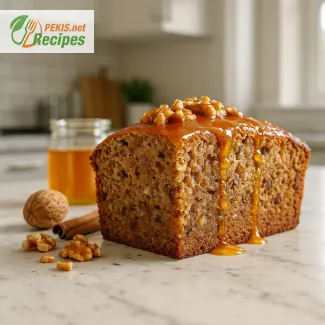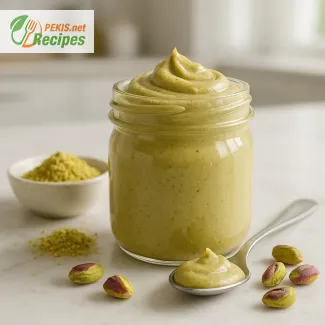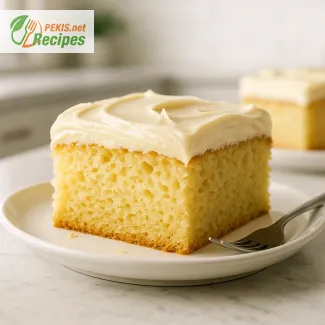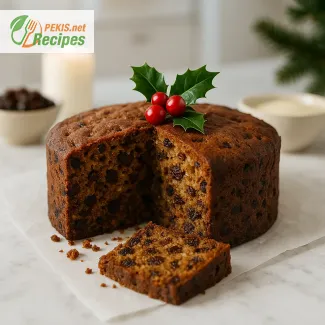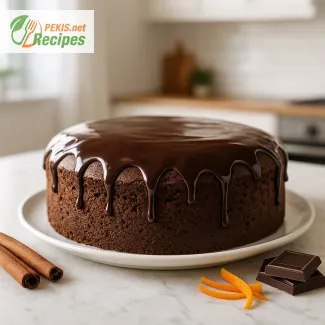Lavish Potica yields 12 rich slices of soft, buttery dough filled with ground walnuts, honey, and cream, baked to a golden, festive perfection. Ready in 85 minutes total (40 prep, 45 bake), it’s a traditional Slovenian dessert known for its spiral layers and deep nut aroma. The texture stays moist and tender for up to 5 days, making it ideal for holidays and special gatherings. Each slice balances sweetness, spice, and nuttiness, capturing the warmth and heritage of home baking.
Years of working with European holiday pastries have taught the value of balance — how yeast dough, walnuts, and butter can turn into something timeless like Lavish Potica. Every detail matters: the way the dough feels under your hands, the warmth of milk, the aroma of roasted nuts rising from the oven. This recipe carries that quiet perfectionism from countless festive kitchens.
PEKIS – professional chef and recipe developer with over 25 years of experience in cooking and baking, specializing in European and international cuisine.
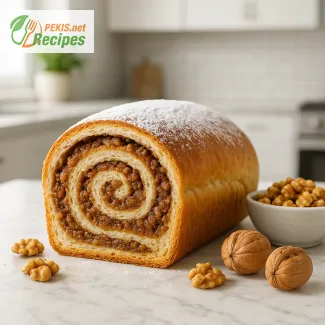
Lavish Potica – A Celebration of Slovenian Tradition
The rich, festive nut roll that embodies the spirit of abundance and home baking
The scent of freshly baked dough, toasted walnuts, and golden butter fills the kitchen long before the Lavish Potica leaves the oven. It’s more than a dessert — it’s a symbol of heritage, a centerpiece of Slovenian celebration, and a culinary masterpiece that blends sweetness, texture, and meaning into every spiral.
Each slice reveals layers of silky yeast dough rolled with a luxurious filling of walnuts, honey, cream, and aromatic spices. The flavor is deep and warm, with tones of caramelized sugar, subtle bitterness from the nuts, and the comforting whisper of cinnamon and vanilla. The outside is bronzed to perfection, slightly crisp to the touch, giving way to an interior that’s tender, buttery, and moist.
Historical roots and festive symbolism
Potica’s origins trace back centuries in Slovenian mountain villages, where it was baked for Easter, Christmas, and weddings — occasions that celebrated prosperity and unity. Families would fill it with what they treasured most: walnuts, poppy seeds, tarragon, or honey, depending on region and season.
The Lavish Potica takes this tradition further, enriching the filling with cream, butter, and dried fruit for a truly indulgent result. In older cookbooks, this variation was known as the “potratna potica”, literally meaning “wasteful potica,” a term once used affectionately to describe its extravagance in using expensive ingredients.
Why you’ll love this recipe
- Luxurious texture – soft, rich dough with creamy walnut layers.
- Authentic heritage – straight from the heart of Slovenia’s festive cuisine.
- Versatile flavor – combines sweetness, nuttiness, and gentle spice.
- Perfect for celebrations – a show-stopping dessert for holidays or gatherings.
- Make-ahead friendly – holds its flavor and texture beautifully for days.
The character of ingredients
- Walnuts bring depth, natural oils, and subtle bitterness that balance sweetness.
- Butter and cream add richness and moisture, giving the dough its soft crumb.
- Honey provides gentle sweetness and floral aroma.
- Egg yolks give elasticity and a golden hue.
- Cinnamon, lemon zest, and vanilla elevate the flavor into something almost perfumed.
- A touch of rum or brandy can add warmth and complexity to the filling.
The combination results in a dessert that’s decadent yet balanced, traditional yet adaptable — one that speaks of time, care, and celebration.
Semantic insight – cultural entity focus: Slovenian festive desserts and nut rolls
In Slovenian culture, desserts like potica stand alongside other Central European rolls such as Gugelhupf and Babka, yet remain unique for their thin, coiled layers and symbolic spiral — representing the circle of life and family.
Over generations, each household shaped its own identity through the type of filling and how tightly the dough was rolled. Even today, grandmothers teach the next generation how to “feel” the dough — never measured, but known by touch.
Storing and make-ahead tips
Lavish Potica stores exceptionally well. Once baked and cooled, wrap it tightly in parchment and keep it at room temperature up to 5 days. The flavors deepen over time, and the dough becomes even more aromatic. For longer storage, freeze in slices — it reheats beautifully in a warm oven without losing texture or fragrance.
If preparing in advance, the dough can rest overnight in the refrigerator, developing extra flavor and a lighter structure before rolling and baking.
Creative variations
- Dried fig and honey version – for a Mediterranean twist.
- Chocolate-hazelnut filling – turns it into a fusion between potica and babka.
- Pistachio and orange zest – adds freshness and color.
- Vegan version – substitute butter with plant-based margarine and use nut milk.
Each variation keeps the heart of potica alive — a spiral of joy, layered with patience and love.
Related traditional recipes
Explore other authentic Slovenian creations from the same heritage:
Walnut Potica (Slovenian Nut Roll) – Traditional Slovenian Recipe
The classic version of potica with pure walnut filling — timeless and deeply aromatic.
Traditional Poppy Seed Filling Recipe from Sister Vendeline’s Bakery
A beautifully smooth poppy seed blend, often used in festive rolls and pastries.
Lavish Potica as a symbol of craft and memory
Every roll of Lavish Potica tells a story — of hands kneading dough in quiet kitchens, of laughter around the holiday table, of a recipe carried through generations. It captures the essence of Slovenian hospitality, where baking is both an art and an act of love.
From the first aroma of melted butter and roasted nuts to the final swirl revealed when sliced, this dessert invites you to slow down, share, and savor.
- In a bowl, combine lukewarm milk, sugar, and yeast. Let it rest for 10 minutes until foamy.
- In a large mixing bowl, combine flour and salt. Add melted butter, egg yolks, vanilla, lemon zest, and the yeast mixture. Knead until a soft, elastic dough forms.
- Cover and let the dough rise for about 60 minutes in a warm place until doubled in volume.
- Prepare the filling: in a saucepan, heat honey, cream, and brown sugar until dissolved. Stir in ground walnuts, cinnamon, rum, and soaked raisins. Mix until smooth and thick; let cool.
- Roll out the dough on a lightly floured surface into a rectangle about 0.5 cm (0.2 inch) thick.
- Spread the walnut filling evenly, leaving a 2 cm (0.8 inch) border.
- Roll the dough tightly from the long side into a log. Carefully place it into a greased baking mold.
- Cover again and let rise for 30 minutes.
- Bake in a preheated oven at 180 °C (356 °F) for 40–45 minutes, until golden brown.
- Let cool completely, then dust with powdered sugar before serving.
FAQ questionHow do I keep Lavish Potica from drying out?
Lavish Potica stays soft when the dough is properly enriched and when it’s stored the right way. After baking, let it cool completely, then wrap it in parchment and keep it at room temperature for up to 5 days. Avoid the fridge, because it dries the crumb. If the filling is rich in walnuts, honey, and cream, the potica will naturally stay moist longer. For serving later, warm slices briefly in a low oven to revive the aroma.
FAQ questionWhy is my dough tearing when I roll it?
That usually means the dough wasn’t rested long enough or it was rolled too thin. Potica dough should be soft, elastic, and slightly buttery. After the first rise, let it rest a few minutes before rolling — that relaxes the gluten. Roll it to about 0.5 cm (0.2 inch) so it can hold the walnut filling without breaking. If the filling is too hot or too dense, it can also tear the dough, so let it cool and spread it evenly.
FAQ questionCan I change the filling in Lavish Potica?
Yes. The dough is very forgiving and works with several traditional fillings. You can swap the walnut filling for poppy seed, tarragon and cottage cheese, hazelnut, or even a honey–raisin–almond version. Keep the consistency similar to the original: the filling should be spreadable, not runny, so it stays in layers and doesn’t sink to the bottom during baking.
FAQ questionWhy does my potica unroll or crack on top?
Cracking often happens when the roll is too tight, when there’s too much filling, or when it rises too quickly in a hot place. Form the roll firmly but not pressed, leave a small empty edge when spreading the filling, and let it rise the second time in a moderately warm spot. Baking at 180 °C (356 °F) gives the dough time to expand without bursting. Greasing the mold well also helps the roll keep its shape.
FAQ questionCan Lavish Potica be made ahead for holidays?
Absolutely. This is one of the best festive breads to make ahead. Bake it 1–2 days before serving; the flavors of walnuts, honey, and butter actually develop and become rounder. You can also freeze the baked and cooled potica, wrapped well, for up to a month. Thaw at room temperature and warm lightly before slicing to bring back the softness.
FAQ questionIs it possible to make a lighter or allergy-friendly version?
It can be adjusted, but every change affects texture. For gluten issues, use a gluten-free all-purpose blend and add a binder (xanthan gum). For dairy, swap milk and butter for plant-based milk and margarine. For nut allergies, try a seed-based filling (sunflower seeds with honey and cinnamon). Even with substitutions, aim to keep the dough enriched and slightly sweet, because that’s what gives potica its signature tenderness.
Lavish Potica captures the essence of Slovenian celebration — a dessert that connects generations through its aroma, patience, and craft. Every spiral of the roll tells a story of buttery dough, sweet walnuts, and warm spice, baked to perfection and shared around festive tables. It’s more than a pastry; it’s a memory you can taste.
The texture balances soft richness and gentle crunch, while the filling melts into the dough to create a perfect harmony of sweetness and warmth. The honey and cream blend smooth the flavor, and the cinnamon and rum give depth that lingers pleasantly after each bite. Even a single slice can fill the room with that comforting scent of home baking.
Because it keeps moist and aromatic for several days, Lavish Potica is ideal for making ahead — a showpiece that remains beautiful and tender on the holiday table. Its ability to hold flavor over time makes it one of those rare baked goods that taste even better the next day.
In every version, whether filled with walnuts, poppy seeds, or figs, the spirit of Slovenian tradition and European craftsmanship remains. It’s the kind of dessert that celebrates the art of slow baking, the touch of the hand, and the joy of sharing something truly rich, authentic, and timeless.
Allergens present in the recipe
- Gluten: from wheat flour
- Eggs: from yolks
- Milk: from butter and cream
- Tree nuts: walnuts
Allergen substitution advice
- Replace wheat flour with gluten-free all-purpose blend (add 1 tsp xanthan gum).
- Replace milk and butter with plant-based alternatives (almond milk, vegan butter).
- Substitute egg yolks with 2 tbsp applesauce or flaxseed gel per yolk.
- Use sunflower seeds or pecans instead of walnuts for nut allergies.
- Vitamin E: 1.8 mg – supports immune defense and skin health.
- Vitamin B1 (Thiamine): 0.2 mg – aids carbohydrate metabolism.
- Vitamin B6: 0.3 mg – contributes to protein synthesis and nerve balance.
- Calcium: 40 mg – supports bones and teeth.
- Iron: 1.6 mg – essential for oxygen transport in blood.
- Magnesium: 45 mg – helps with energy production and muscle function.
- Zinc: 1.2 mg – supports immunity and cell regeneration.
- Phosphorus: 90 mg – important for energy balance and bone strength.
- Polyphenols: 120 mg – from walnuts, protect against oxidative stress.
- Flavonoids: 35 mg – from honey and cinnamon, support cardiovascular health.
- Vitamin E compounds: 1.8 mg – prevent lipid oxidation and cell aging.
- Melanoidins: 15 mg – formed during baking, contribute to aroma and antioxidant effect.
- Phenolic acids: 25 mg – enhance metabolic and anti-inflammatory functions.

